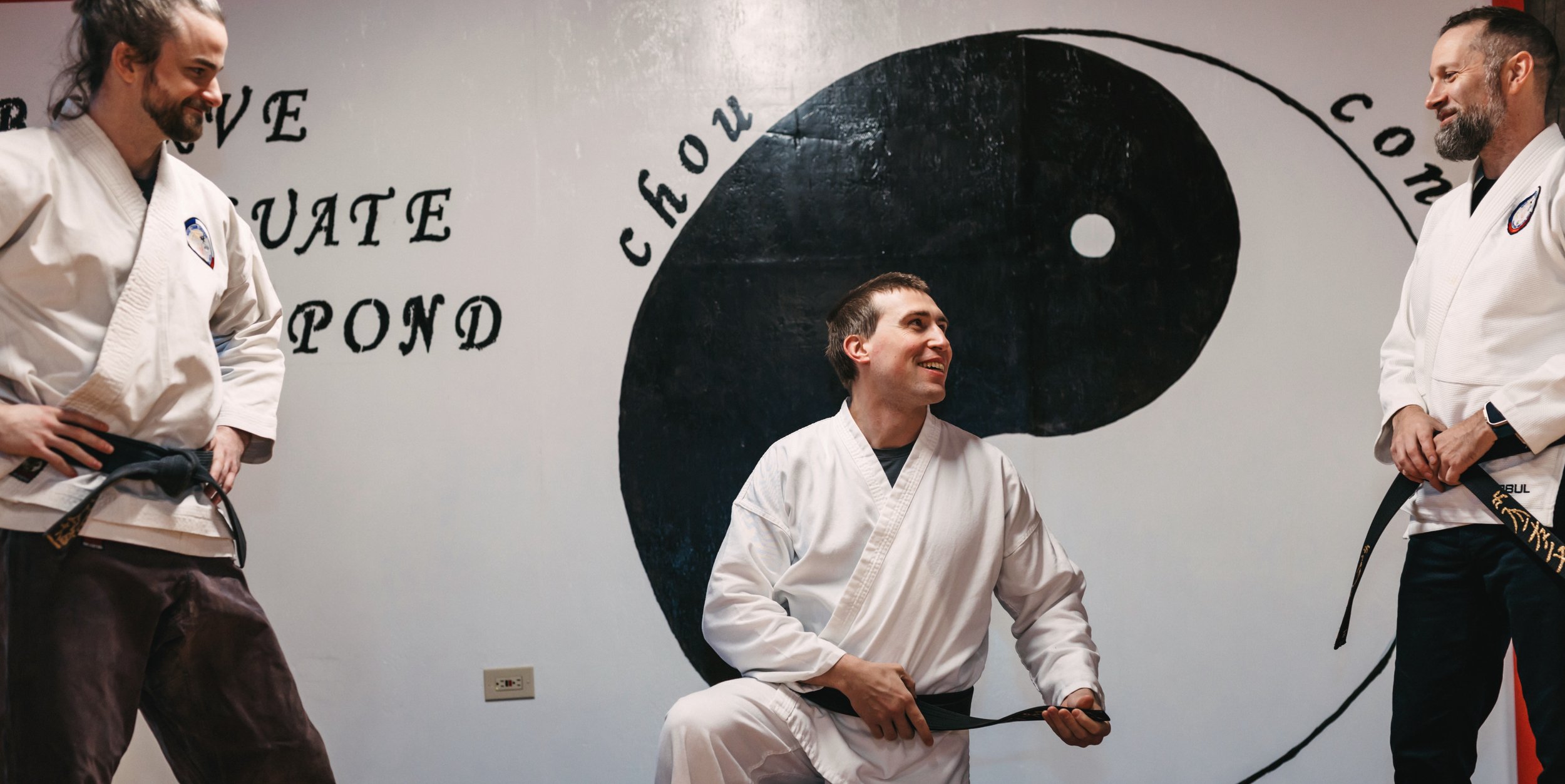
FAQs
-
Practice.
-
How quickly do you want to improve? The more you practice the faster your skill will develop.
-
As often as possible. Class time is precious because you are being observed by people who are knowledgable about the skills you are developing. The ability of those people to observe your performance in real time is priceless. Progress will be most rapid and generalizable with more frequent class attendance.
-
Yes. We are practicing forms of physical, emotional and mental combat. Pain in each of these areas is not uncommon. However, it is not the goal of training to cause anyone pain. Instead, we understand that pain is an inevitable consequence of combative interaction with others. Though some pain is common in martial training, serious injury is not common. Our instructors and students have been practicing martial arts for many years without serious injury.
-
We will take care of you. Traditional martial arts systems developed knowledge of how to injure and disable opponents. The knowledge acquired in developing skills of destruction also formed the basis of the skills of healing. We provide training in these basic healing practices. We make no claim to be a substitute for the medical community. We work closely with them to improve whatever injuries you may incur.
-
Exercise makes you stronger. The more you strain a muscle the stronger it gets. Strength is the outcome of training the nervous system as well as the muscles to work in coordination to achieve a particular movement. Strength is a skill. Exercise as we do it is a practice in which you develop the ability to bring more and more awareness to the form of the exercise so that the movement becomes easier.
-
Laura 48 says “Traditional martial arts training in the Whe Chun system gave me back the ability to serve the community that I love. I can sit in the floor circle with the preschoolers again, and I’m an example of health for my community.”
Carl 28 says “Being part of the Whe Chun System motivates and trains me to continue improving the best version of myself. The culture at the Dojo is brimming with positive and out-of-the-box thinking on movement, relationships, and many other aspects of life. I am so grateful to have access to the Dojo!”
Jimmy 13 says “Martial Arts makes me strong.”
Robby 16 says “The classes are a great way to motivate yourself to exercise and to get to know how your body works. It doesn’t feel like you’re with a bunch of strangers, it feels more like a family helping build itself to be stronger.”
Brad 55 says “Focus. Mindfulness. Community. Self-confidence. Physical and mental fitness. These are some of the characteristics developed in the Whe Chun Dojo. Students of all ages and abilities are met where they are and progress at their own rate. I have benefited greatly from being part of the Whe Chun system and have observed younger students grow too. There is a place for anyone to learn and benefit from Whe Chun.”
Tim 56 says “I feel the community that Sensei fosters at the Dojo is one of respect, challenge, discipline, humor and deep compassion. The Dojo is a living space that continues to be built by the community with Sensei’s stewardship. Poultney is truly fortunate to easily access what the Dojo has to offer.
Evan 14 says “Martial Arts gives me confidence in crowds of people.”
Zack 30 says “The Poultney Dojo was a formative part of my upbringing, and it continues to bring me happiness and fulfillment. Training here is about more than punches and kicks—it’s a path toward self-mastery through discipline, meditation, and deliberate practice. The supportive community of students and teachers makes the journey richer, helping you grow through challenges. The Poultney Dojo is a special, welcoming place, ready to meet you where you are.”
Justin 25 says “I have been doing Martial Arts since I was 8. Along with the given increase in strength and flexibility, it has also given me the confidence to handle some difficult situations. For many of the things that have happened to me outside of the Dojo, I have had similar experiences inside the Dojo. Seeing and feeling that I have already faced a situation inside the Dojo makes encountering it outside the Dojo less stressful. I encourage anyone to come give it a try!”
Adam says “These are some of the wonderful things I have found since becoming a member of the Dojo: feeling much healthier, learning a valuable skill, grounding mind heart and soul, proper workouts with and without equipment, and most important, comradery with the community. It is truly a wonderful experience my family and I treasure. I can not thank every single member enough for welcoming us and sharing the knowledge. Thank you.”

Upcoming Events
-
Introduction to Kettlebells
Kettlebells are a powerful adjunct to strength training that build power into movements basic to martial arts practice. The squat, the hinge, the get up are movements practiced frequently in martial exercises and are basic activities in kettlebell training.
-
Self-Defense
Self-defense is basic to martial arts training. We will demonstrate and practice mental, emotional, and physical forms and techniques likely to increase your safety and confidence in your daily activities.
-
Open House
Come to the Dojo, meet some of our instructors and tour our facility. See what we have to offer and have your questions answered about who we are and what we can do for you.